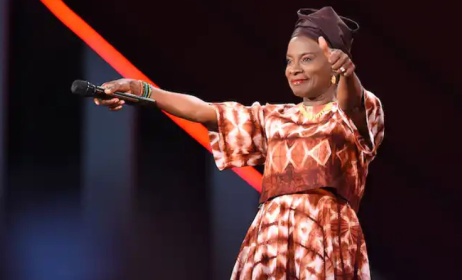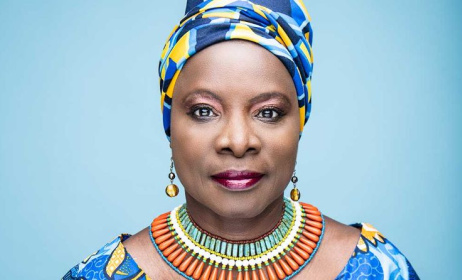Angelique Kidjo’s ‘reappropriation’ of Talking Heads album receives praise
By Oris Aigbokhaevbolo
Early this month, Beninese artist Angelique Kidjo took to Carnegie Hall in New York. Her mission was a simple one: to reinterpret the classic Remain in Light, the early '80s album by American band Talking Heads.
The album, which was much praised upon its release in 1980, was inducted into the National Recording Registry this year. It is acclaimed to be one of the best albums by an American artist or band.
Drawing influences from rock, pop and African music, the album is acclaimed for its sonic innovation. It is for the same reason—chiefly its African influences—that 37 years later Kidjo elected to reinterpret it in one of its original idioms.
“I fell in love with the Remain in Light album,” she said in an interview before her Carnegie Hall performance. “Brian Eno and Talking Heads understood the magical power of African music but instead of trying to clone it they created their own style based on the hypnotic rhythm patterns of Fela Kuti’s Afrobeat. The cryptic lyrics were also resonating with me. Somehow I felt I was hearing, in a strange way, social commentaries on the state of my continent.”
Past this connection from many years ago, Talking Heads is today connected to African music directly. Byrne, the band’s frontman, founded Luaka Bop, a record label with an interest in African music. The establishment is responsible for bringing the music of the late William Onyeabor into the digital era.
Playing Carnegie Hall is the culmination of a long-held aspiration for Kidjo. “You dream about a lot of stuff but there are things that you think are out of reach or you would never be able to do, never be able to achieve,” she told Playbill(link is external). “Playing Carnegie Hall was one of them, as was Royal Albert Hall in London and the Sydney Opera House. Those are the prestigious places that are in everybody’s psyche—magnificent places and magical places and spiritual places. So for me, being born in a poor country to a poor family and coming from Africa, to be able to spread the variety of music that we live with and to be able to share it, at Carnegie Hall of all places, is something.”
Byrne joined Kidjo on stage at Carnegie Hall. The singers first met in the early '90s, before the release of Kidjo’s hit song ‘Agolo’ for which she got her first Grammy nomination. His band came to see her play, the first American band to do so. Years after this initial meeting, he wrote about their forthcoming collaboration. “This is what musicians and artists do,” he said. “Stuff gets tossed back and forth. This should be exciting!”
And so it proved. Their performance together, as with the entirety of Kidjo’s reimagination of the decades-old album, has received commendation from members of the New York media, many of whom consider the Talking Heads album an important cultural artifact for the US. Ahead of the performance, the NYPost said, “Angelique Kidjo is about to do some re-appropriation...”
The New Yorker(link is external) based its praise on the racial aspects of Kidjo’s interpretation. Tagging it “a brilliant return” for the album, its writer wrote about the line-up on stage: "This race-transcending arrangement was transgressive and revelatory.” The New York Times(link is external) at some length deemed “all of Ms Kidjo’s changes … grounded in affection and ingenuity.”
As for Kidjo herself, she had few words. "Once In A Lifetime!" she wrote on her Facebook page. "A night at Carnegie Hall I will remember FOREVER."




































Comments
Log in or register to post comments